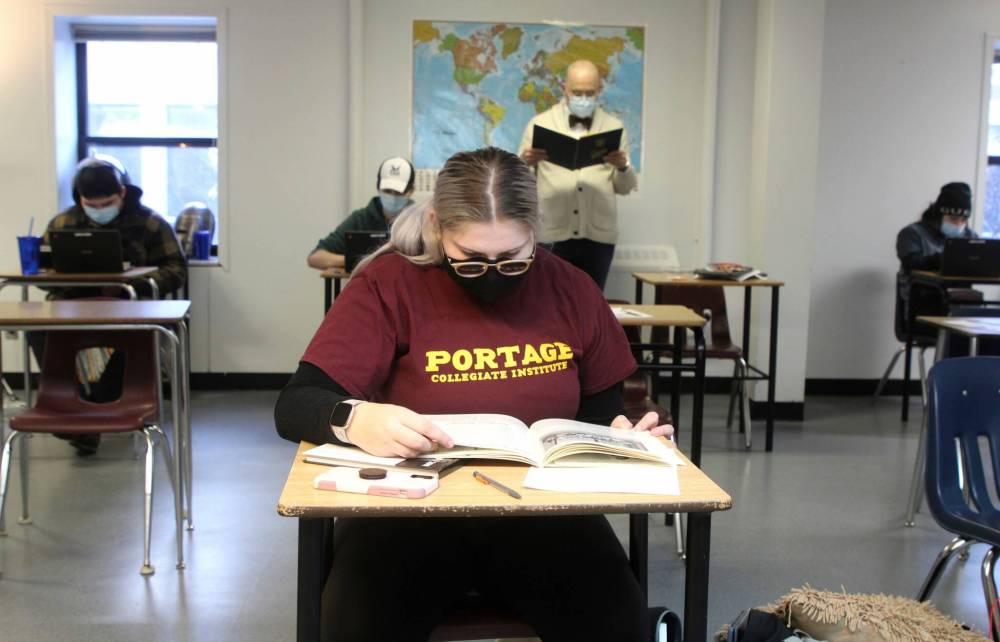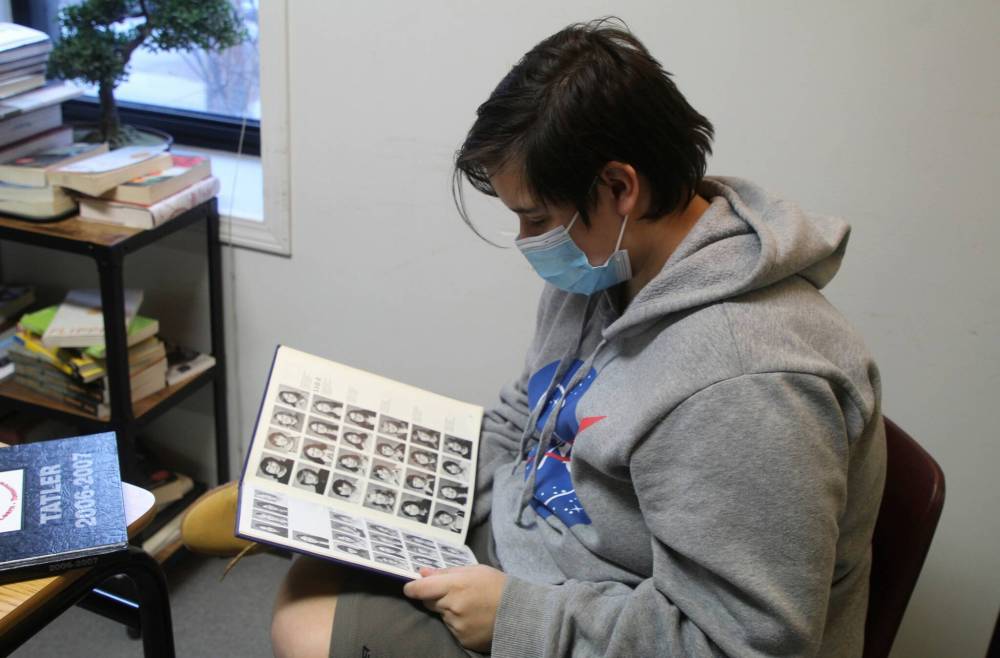Roving classroom gives students educational roots
Advertisement
Read this article for free:
or
Already have an account? Log in here »
To continue reading, please subscribe:
Monthly Digital Subscription
$0 for the first 4 weeks*
- Enjoy unlimited reading on winnipegfreepress.com
- Read the E-Edition, our digital replica newspaper
- Access News Break, our award-winning app
- Play interactive puzzles
*No charge for 4 weeks then price increases to the regular rate of $19.00 plus GST every four weeks. Offer available to new and qualified returning subscribers only. Cancel any time.
Monthly Digital Subscription
$4.75/week*
- Enjoy unlimited reading on winnipegfreepress.com
- Read the E-Edition, our digital replica newspaper
- Access News Break, our award-winning app
- Play interactive puzzles
*Billed as $19 plus GST every four weeks. Cancel any time.
To continue reading, please subscribe:
Add Free Press access to your Brandon Sun subscription for only an additional
$1 for the first 4 weeks*
*Your next subscription payment will increase by $1.00 and you will be charged $16.99 plus GST for four weeks. After four weeks, your payment will increase to $23.99 plus GST every four weeks.
Read unlimited articles for free today:
or
Already have an account? Log in here »
Hey there, time traveller!
This article was published 22/12/2021 (1468 days ago), so information in it may no longer be current.
PORTAGE LA PRAIRIE — A longtime educator in Portage la Prairie, James Kostuchuk is known for his conversational teaching style and belief the best learning happens when students are inherently motivated to complete a task.
Kostuchuk’s lesser-known role — which has become equally important, since the start of the 2020-21 school year — is as a driver.
On weekdays, he starts work at 8 a.m. in a silver Toyota Sienna minivan that sits up to six passengers, picking up students who need a ride. The teenagers, all of whom are enrolled in a new alternative program at their local high school, request a lift via direct message to @rovingcampus on Instagram.

“What we’ve found is the simple solution to getting students to attend school is to remove barriers and to work with them in removing whatever barriers they have,” said Kostuchuk, one of the founder’s of the roving campus at Portage Collegiate Institute.
The roving campus launched as a pilot project in September 2020, with a goal of addressing chronic school absenteeism and student disengagement in Portage la Prairie School Division; both issues are long-standing and linked to the district’s high child poverty rate. In 2019, 30 per cent of youth lived in low-income households.
True to its name, the ethos of the educational experiment is about hands-on learning through field trips to city hall, the local cinema and everywhere in between.
Individualized education, goal-setting and partnerships with community organizations to support student hurdles both at school and home are also key pillars of the program based out of the basement of the community’s downtown high school.
Transit access has long been a barrier for attendance, owing to factors including an absence of public transit, costly cab fares, lengthy commutes to school in blustery weather, inability to afford proper winter boots, and the fact many parents in Portage are shift workers who cannot drive students themselves.
It only made sense one element of the roving campus would incorporate free transportation to and from classes through collaboration with the Portage Community Revitalization Corp. — one of its many community partners.
The trio of teachers behind the project is in agreeance much of their success, made possible because of funding from both the Tamarack Institute and Manitoba Teachers’ Idea Fund, is linked to both the minivan service and a free lunch program through the school’s canteen.
Overall, the attendance of students in the program this year has increased by an average of 40 per cent in comparison to rates in 2018-19, the last year unaffected by COVID-19.
Grade 12 student Kailey Elias commutes to and from school via the classroom van Tuesdays, Wednesdays and Thursdays — the three days students in the roving campus are required to attend.

In pre-pandemic times, Kailey said she missed roughly half of the school year, both because she was disinterested in rote learning and has severe social anxiety. The 17-year-old said the remote learning brought on by COVID-19 only lessened her motivation to participate and she was unable to earn all her credits last year.
“I was so sure I wasn’t going to graduate this year. I was so set on, ‘I’m going to have to go another year, I’m not going to graduate on time.’ Now, I have no doubt I’m going to graduate,” said Kailey, who is working towards making the honour roll in 2022.
She attributes her recent academic success to the roving campus’ small class size of 22, the close relationships she has built with her three teachers, and the hands-on learning.
“We have a truncated week and, sometimes, a truncated school day, but we try and offset that by giving them activities and learning opportunities that are higher quality, that are more meaningful and that are more about their community and their lives,” said Brett Geisel, a teacher with the program.
Geisel estimates one-third of the program takes place outside of the home base in Room 84.
Since the start of the school year, students have studied history on-site at both a former military training camp and residential school. They have learned about civics firsthand by delivering in-person speeches to the mayor to outline ideas to improve their city. Pupils, the majority of which identify as Indigenous, have also spent time doing cultural and land-based learning.
“We’ve brought back the land values, the teachings, spending a day fishing, spending a day taking and talking about our Indigenous history and some of the sites we have in Portage,” said Cornell Pashe, Indigenous community co-ordinator for the City of Portage la Prairie.
Since the pandemic has complicated field trips, the teachers have been doing a mix of excursions and organizing opportunities for students to obtain certificates in first aid, food handling, and educational assistant training, among other things. The school also works closely with Communities Building Youth Futures, so students have access to wraparound support services required to succeed after they graduate.

Morag Morison, lead co-ordinator for Communities Building Youth Futures, often helps students learn how to obtain personal identification, such as Indian status cards and SIN cards.
“Students are coming out of this program with a lot of the hard skills that you would learn in school, like math and science and those more stereotypical ones,” said Morison.
“But something that’s really neat in this program is students are coming out of it with confidence in themselves to be able to take on hard situations in the world, as well as do things like budget and find a job.”
maggie.macintosh@freepress.mb.ca
Twitter: @macintoshmaggie

Maggie Macintosh
Education reporter
Maggie Macintosh reports on education for the Free Press. Originally from Hamilton, Ont., she first reported for the Free Press in 2017. Read more about Maggie.
Funding for the Free Press education reporter comes from the Government of Canada through the Local Journalism Initiative.
Every piece of reporting Maggie produces is reviewed by an editing team before it is posted online or published in print — part of the Free Press‘s tradition, since 1872, of producing reliable independent journalism. Read more about Free Press’s history and mandate, and learn how our newsroom operates.
Our newsroom depends on a growing audience of readers to power our journalism. If you are not a paid reader, please consider becoming a subscriber.
Our newsroom depends on its audience of readers to power our journalism. Thank you for your support.

